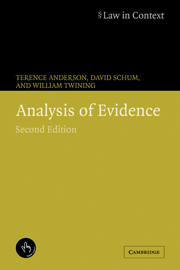Book contents
- Frontmatter
- Contents
- Preface
- Acknowledgments
- Tables of cases and statutes
- Table of legislation and rules
- List of abbreviations
- 1 Evidence and inference: some food for thought
- 2 Fact investigation and the nature of evidence
- 3 Principles of proof
- 4 Methods of analysis
- 5 The chart method
- 6 Outlines, chronologies, and narrative
- 7 Analyzing the decided case: anatomy of a cause célèbre
- 8 Evaluating evidence
- 9 Probabilities, weight, and probative force
- 10 Necessary but dangerous: generalizations and stories in argumentation about facts
- 11 The principles of proof and the law of evidence
- 12 The trial lawyer's standpoint
- Glossary of terms and symbols
- References
- Index
Preface
Published online by Cambridge University Press: 23 November 2009
- Frontmatter
- Contents
- Preface
- Acknowledgments
- Tables of cases and statutes
- Table of legislation and rules
- List of abbreviations
- 1 Evidence and inference: some food for thought
- 2 Fact investigation and the nature of evidence
- 3 Principles of proof
- 4 Methods of analysis
- 5 The chart method
- 6 Outlines, chronologies, and narrative
- 7 Analyzing the decided case: anatomy of a cause célèbre
- 8 Evaluating evidence
- 9 Probabilities, weight, and probative force
- 10 Necessary but dangerous: generalizations and stories in argumentation about facts
- 11 The principles of proof and the law of evidence
- 12 The trial lawyer's standpoint
- Glossary of terms and symbols
- References
- Index
Summary
The why
Inferential reasoning, analyzing and weighing evidence, forming judgments about what has happened in the past or what is likely to happen in the future are a necessary part of coping with the problems of everyday living. They are basic human skills that form part of ordinary practical reasoning. Historians, detectives, doctors, engineers, and intelligence analysts have to develop and apply these skills with rigor and precision in specialized professional contexts. So do lawyers.
These skills have not traditionally formed part of professional training. Perhaps this is because they are perceived to be “mere common sense”; or because it has been felt that they can only be learned by practical experience “on the job”; or because of a belief that these are matters of “intuition” or that great lawyers or historians or detectives or diagnosticians are “born and not made.”
This book starts from a different premise. Building on the work of the American legal scholar John Henry Wigmore (1863–1943), we believe that skills in analyzing and marshaling evidence and in constructing, criticizing and evaluating arguments about disputed questions of fact are intellectual skills that can and should be taught effectively and efficiently in law schools. They are as essential a part of “legal method” as legal analysis and reasoning about questions of law. Common sense, intuition, and practical experience all have a part to play in exercising these skills, but they are not adequate substitutes for a systematic grounding in what Wigmore called “the principles of proof.”
- Type
- Chapter
- Information
- Analysis of Evidence , pp. xvii - xxivPublisher: Cambridge University PressPrint publication year: 2005



